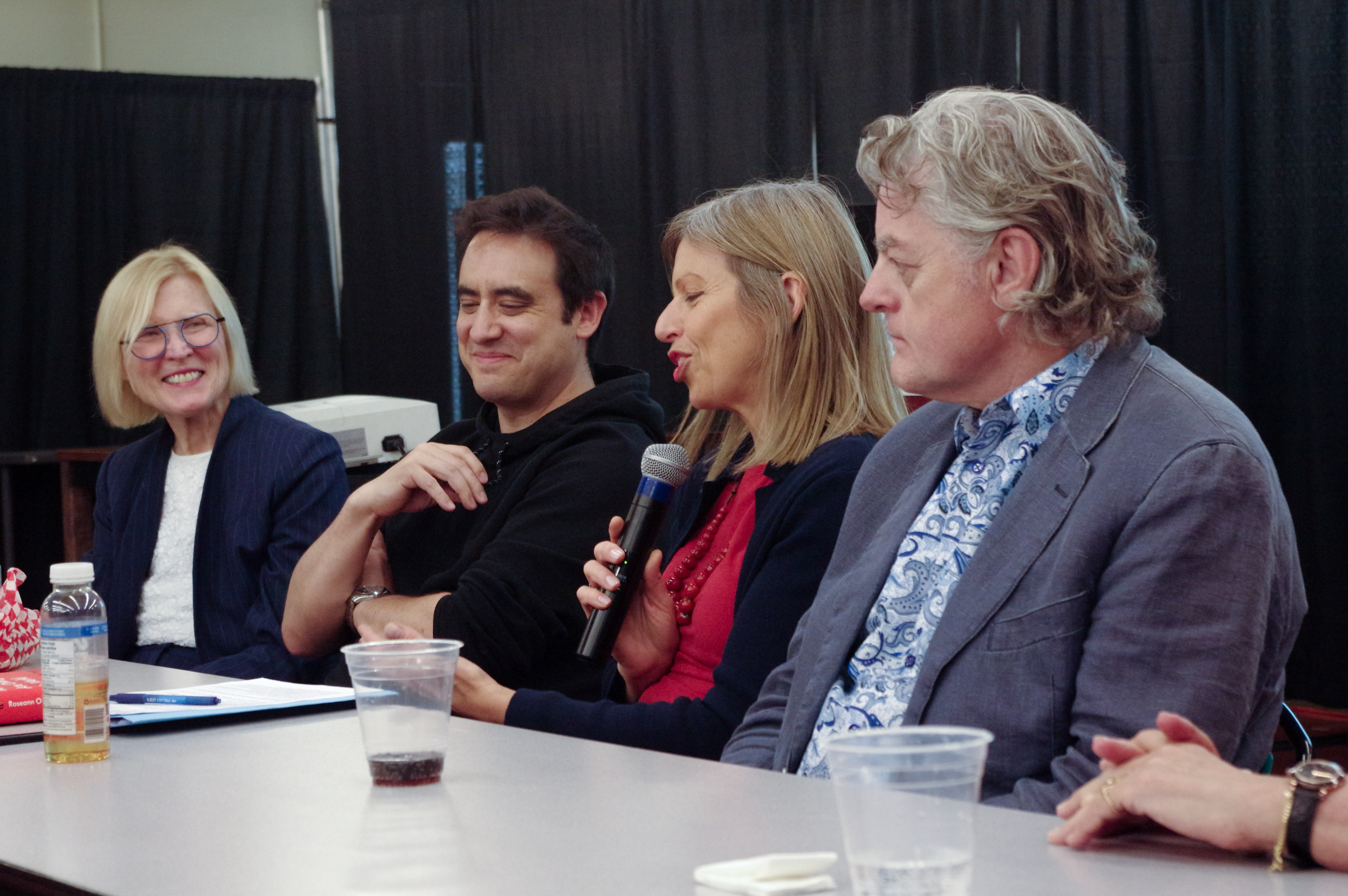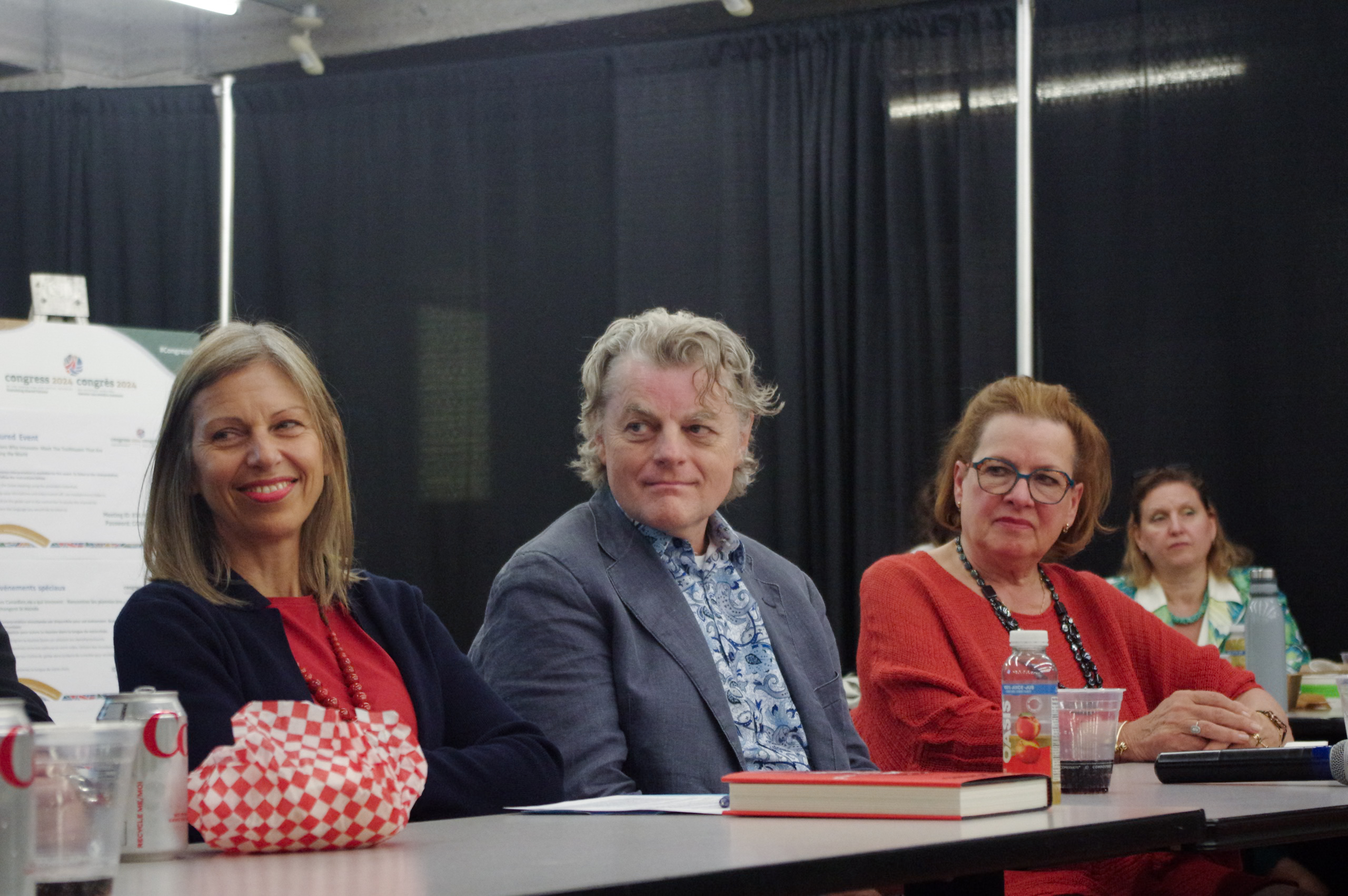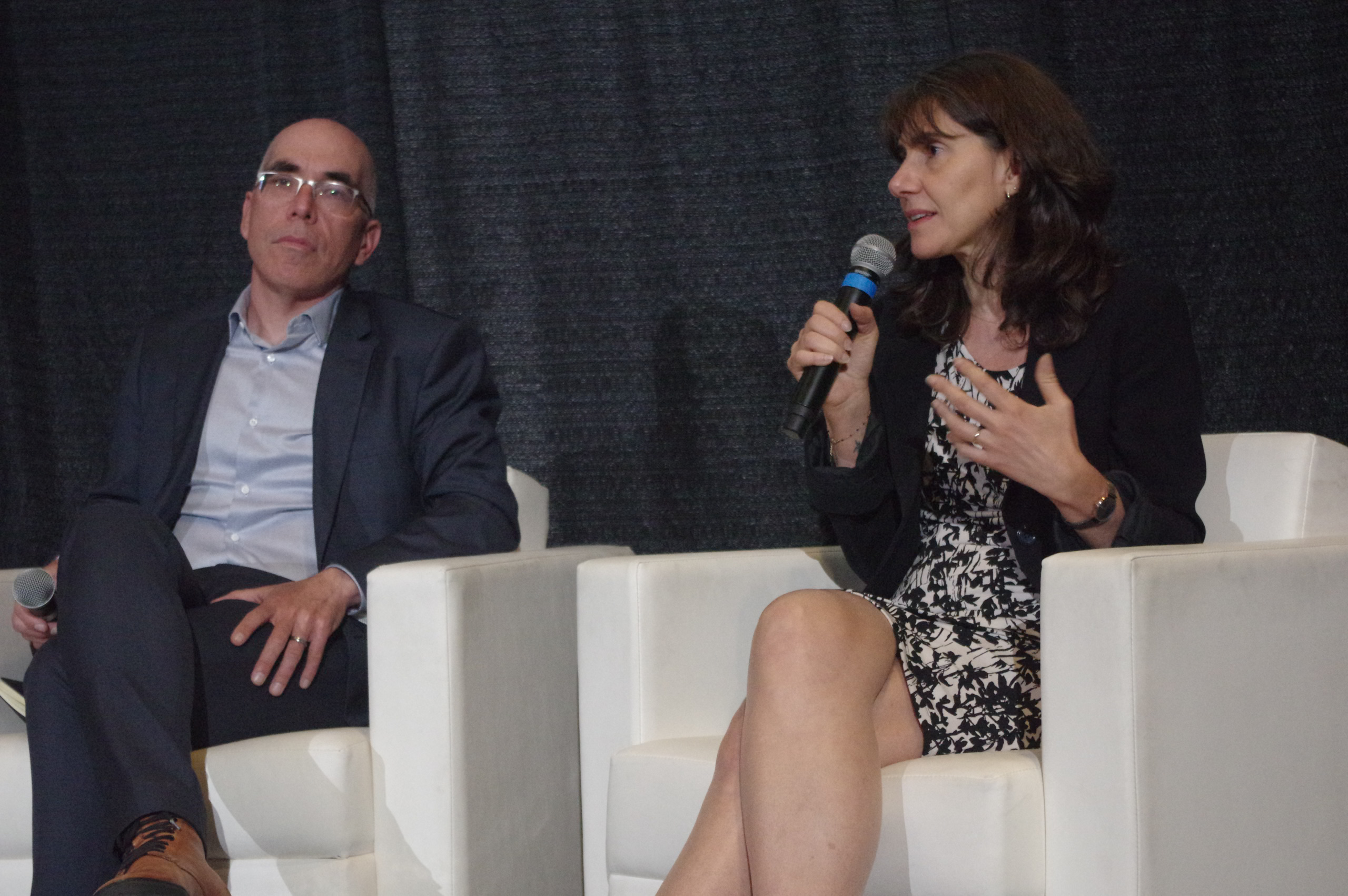Sustainable AI – sentience, ethical risks, and job security
The relationship between human beings and AI systems is no doubt a hot-button issue in academia and the world at large. Recent developments in AI technology have raised ethical issues, making us all wonder – how do we guarantee AI will be used responsibly and equitably?
At the first Big Thinking panel at Congress of the Humanities and Social Sciences 2024, esteemed researchers Dr. Jocelyn Maclure and Céline Castets-Renard discussed the ethics of AI systems and how they might affect human rights, social justice, and the political landscape of the future.
Sentient AI – fact or fiction?
Dr. Maclure opened the discussion by highlighting the key differences between the actual AI systems such as the large language models (LLMs) we use today and what he called “assumed AI systems” such as sentient artificial intelligence.
“It’s important to distinguish between the AI systems we use and the ones we think we have,” he explained. Artificial intelligence as we see in films and science fiction novels firmly remains in the realm of imagination in the modern context, he continued. “Intelligence and consciousness are based in biology [...] multi-dimensional intelligence is connected to a body that feels and experiences the world.”
LLMs & generative AI systems – ethical risks
While sentient robots are unlikely, the proliferation of LLMs and generative AI systems developed by multinational tech corporations indeed poses several ethical quandaries. Céline Castets-Renard notes that “We must ask ourselves whether all uses of AI are to be taken [...] it’s the whole question of the risks of AI which are socially unacceptable.”
She noted the issue of “technological colonization” where AI systems developed for use in the global south don’t include local perspectives. She highlighted recent AI projects in West Africa that raised issues of data privacy for young students, for instance. Another risk, as underlined by Dr. Maclure, is the spread of political disinformation on a massive scale. “LLMs can be used to generate disinformation at a large scale,” he said. In a political context, this poses a significant risk to the general public’s ability to make critical decisions during an election cycle.
Will AI eventually replace every job?
The question of AI systems replacing humans in the job market depends on how you view AI systems, explained Dr. Maclure. While some jobs are potentially at risk, Dr. Maclure noted that it’s more about integration rather than replacement. “We’ll have to work with AI in the job market,” he said, “human intelligence is still required [to implement AI].” Céline Castets-Renard added that legislation around AI systems will be important moving forward and explained that, “in relation to the scale and characteristics of AI today I think that we need to adopt legislation. This is what Europe did and what Canada will do with Bill C-27.”
This was the first of our four Big Thinking lectures at Congress 2024. Explore our upcoming discussions on Sustaining culture, Sustaining nature, and Sustaining political community below.
Skills for transitioning to a non-academic career post-PhD
Coming out of the academic world into the workforce is daunting for many recent graduates. It's even more daunting when you’ve spent the better part of your life in academia studying and writing your PhD dissertation. This, among other things, was one of the main topics discussed at the TRaCE Talks: PhD Career Paths Beyond Academia Career corner session featuring four McGill PhD graduates: Janet Janzen, Marie-Pierre Gadoua, Amanda Jarrell, and Hélène Laurin, the discussion ranged from each of their experiences with non-academic careers to how to craft a successful resume for the modern job market.
According to them, these are some of the best academic skills to have when you’re looking for a new job outside of academia.
Discipline
“Work while you’re studying so you can make yourself known and develop your C.V.”
-Marie-Pierre Gadoua, PhD in Anthropology, Cultural Programming and Social Mediation Coordinator at the Bibliothèque et Archives nationales du Québec
Mixing work and academic responsibilities requires a high degree of self-discipline, time management and prioritization. By working during your PhD studies, you not only gain practical experience but also demonstrate your ability to handle multiple demanding tasks simultaneously. This is a quality that employers highly value, as it indicates reliability, discipline, and an exceptional work ethic.
Determination
“Go out there and apply to jobs you aren’t qualified for. Go where you’re valued.”
-Janet Janzen, PhD in German Studies, Director of Marketing at Revenue Management Labs
Job descriptions list ideal qualifications that few candidates fully meet. By applying for these positions anyway, you show potential employers that you are determined in your ability to learn and adapt.
Communication Skills
“The communication skills I learned in university were important when having to demonstrate my skills and prove myself to job prospects.”
-Marie-Pierre Gadoua, PhD in Anthropology, Cultural Programming and Social Mediation Coordinator at the Bibliothèque et Archives nationales du Québec
The communication skills that you develop at university are also crucial for developing relationships and a sense of community at work. Effective communication not only helps in job acquisition, but also in fostering a collaborative work environment
Adaptability
“[It was] bittersweet leaving academia, but I realized it wasn’t a path to realistically pursue for me [...] I had to figure out how to position myself in the industry after academia.”
-Amanda Jarrell, PhD in Educational Psychology, User Research Topic Lead at Ubisoft Montreal
Being adaptable in the face of adversity is an essential skill that you develop in academia. One of Amanda’s first jobs was in the fintech industry – a big leap away from her PhD studies. She succeeded thanks to the adaptability she learned throughout her academic career.
Strategic Thinking
“It’s perfectly fine to leave [a job]...it’s good for your career to leave companies on a regular basis”
-Janet Janzen, PhD in German Studies, Director of Marketing at Revenue Management Labs
Strategic thinking in any post-academic pursuit involves making informed decisions about career moves and understanding the long-term benefits of gaining diverse experiences. “Be brave and bold with what you want,” she added, “We [PhD graduates] have a lot of value to companies because of the work we’ve put in. We are trained to see the world from a unique perspective that others might not have”.
Beyond the swipe: Interrogating dating app approaches for sustaining user safety
Welcome to Congress in Conversation, a special series presented by the Big Thinking Podcast in partnership with The Conversation Canada where we convene researchers presenting at Congress 2024 to share their research and experiences within the context of shared responsibility to our society, systems, and planet.
For this first episode, our host Nehal El-Hadi, journalist, editor, and producer at The Conversation Canada is joined by Christopher Dietzel, a postdoctoral fellow at Concordia University.
Dating apps like Tinder, Bumble, and Grindr facilitate dates, hook-ups, and friendship, but people can experience a range of emotional, physical, sexual, financial, social, and cultural harms online and in person. This study considers to what extent apps provide sufficient policies, features, and supports that address the range of harms that diverse users can experience. To do this, we analyzed the content moderation policies, terms and conditions, safety features, and other in-app mechanisms from 30 dating apps popular in Canada. Findings shed light on policies, features, and other aspects of the app experience that enhance and/or hinder diverse users’ safety and reveal gaps in safety measures. The findings will be used to create an interactive Digital Dating Safety Map, a tool that people can use to compare apps’ safety mechanisms and risks, providing individuals with greater literacy and agency in making technology-related dating decisions.
A plunge into the art of Quebecois comics
Michel Rabagliati, author of the "Paul" series, and host and lecturer Michel Giguère recently shared the stage to discuss the evolution of Quebecois comics. Thanks to this conference, we were able to discover not only Rabagliati's remarkable career path, but also Giguère's profound reflections on the industry, which has greatly evolved in recent years.
Modest beginnings and all-consuming passion
Rabagliati had a great passion for comics from an early age. When he was a child, he wanted to move to Belgium, which he considered to be the home of the comic strip. His love of drawing continued throughout his career as a graphic artist, and in 1998 he finally began drawing the Paul series. The importance of these humble beginnings was highlighted by Giguère, demonstrating how childhood dreams can turn into successful careers.
The Pandemic: A creative catalyst
Rabagliati's recent career has been marked by the COVID-19 pandemic. While temporarily unemployed, he found time to realize a book idea he'd had for 15 years. According to Giguère, this period of confinement was a time of reflection and creativity for many artists, offering the chance to bring long-awaited projects to fruition.
The genesis of "Paul" and the influence of La Pastèque
Rabagliati's initial activities included "Paul à la campagne" and "Paul apprenti typographe". However, his exchange with the creators of Éditions de La Pastèque changed everything. Thanks to their recognition of his work, Rabagliati was able to publish his works. Today, he holds the publishing house's sales record with nine albums in the Paul series and a special Paul à Montréal series. The importance of La Pastèque in the professionalization of Quebec's comics scene was underscored by Giguère, who highlighted their essential role in the success of many authors.
A unique, committed style
Rabagliati's graphic style is his own, influenced by his use of Illustrator and his experience in graphic design. His dry, incisive style reflects an economy of resources and exceptional narrative efficiency. His comics are both accessible and profound, as he prefers to draw rather than describe settings at length. According to Giguère, this style, though apparently simple, is extremely effective for telling complex, emotional stories.
The importance of narration and E=emotion
What really sets Rabagliati apart is his ability to capture the essence of his characters and tell deeply human stories. In his simplicity, every character, even the most secondary, is rich and touching. Rabagliati acknowledges that "Paul" is his other self, which gives him the freedom to play with emotions and situations in a creative and free way. According to Giguère, this method allows readers to identify with the characters and stories, making Rabagliati's comics universal.
Giguère's outlook on the future of comics
Giguère's thoughts on the future of comics in Quebec were also presented. He mentioned the importance of supporting young talent and persevering with innovation in the field. In his opinion, it is crucial to professionalize and diversify publishers to ensure a prosperous future for Quebec comics. He also stressed the importance of projects like Rabagliati's to inspire and motivate the next generation of artists.
Discussing Canadian innovation with CFI President & CEO O’Reilly Runte
O’Reilly Runte, President and CEO of the Canada Foundation for Innovation, held an inspiring event that highlighted the diverse and impactful work of Canadian innovators featured in her latest novel Canadians Who Innovate: The Trailblazers and Ideas That Are Changing the World. We were lucky enough to hear from five innovative Canadians featured in her book, including Anna Triandafydillidou, an expert in immigration; Andrew Pelling, a creative chemist; Stan Gordon Harwood, a software developer turned visual artist; and Bertha Maria.
Each panelist shared their unique journey and motivations, revealing a common theme of international experience, resilience, and deep passion for their fields. Andrew Pelling, a professor at the University of Ottawa and founder of multiple start-ups such as Pelling Lab, emphasized the role of serendipity in innovation, explaining that many groundbreaking innovations arise from unexpected moments and environments that encourage curiosity and experimentation. Pelling believes that fostering a culture where people feel free to ask questions and take risks can accelerate the pace of innovation.
The panelists' narratives also highlighted the adversity they faced. The vast majority of innovators came from humble backgrounds and forged their own paths through a rigorous work ethic and determination. Their success stories were built on a foundation of passion, dedication, and a thorough understanding of their respective sciences and histories.
O’Reilly Runte concluded the panel by emphasizing that innovation is not limited to any single field. Her book celebrates innovators from all walks of life, underscoring the idea that everyone has the potential to be innovative. This inclusive perspective reminds us that innovation can come from anywhere and anyone, driven by diverse experiences and backgrounds.
Learn more about O’Reilly Runte’s book Canadians Who Innovate: The Trailblazers and Ideas That Are Changing the World and pick up your own copy below!


Art and music in times of crisis
Rachelle Chiasson-Taylor's career in the music world is anything but conventional. With a career spanning performance studies, musicology and archives management, she has an impressive ability to speak on the value of art and music in times of crises, and how they can both heal and unite us.
In her talk, Rachelle stressed the importance of recognizing and integrating diverse perspectives. In particular, she emphasized the historical importance of institutions to lead the charge, such as the Vincent d'Indy School of Music, which aimed to revive religious music after the French Revolution.
The enduring power of art to transcend personal identity and speak to universal human experiences was best highlighted in Rachelle’s emphasis on the importance of EDID in the arts. In her view, inclusion marks a significant evolution in our vocabulary and societal structures, helping to both promote and enact social change. “Bring your humanity into your work” Dr. Chiasson-Taylor stated, noting the importance of incorporating art and music into our collective actions for change.
Photography courtesy of Shawn Ayyadi Pilon


